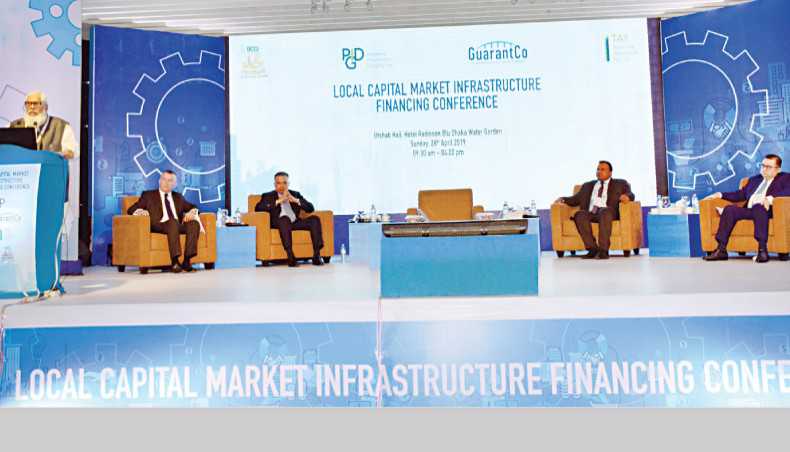Rudimentary capital market to blame for banking sector woes

Image collected
he absence of vibrant stock and bond markets is to blame for the banking sector’s current woes including liquidity crunch and bulging non-performing loans, experts said yesterday.
Banks are providing long-term loans with their short-term deposits, which is essentially the root of the problem, they said.
“This is fundamentally a serious mismatch,” said Salman F Rahman, the prime minister’s private sector industry and investment adviser.
Rahman’s comments came at a conference styled ‘Local Capital Market Infrastructure Financing’, jointly organised by the Dhaka Chamber of Commerce & Industry (DCCI) and GuarantCo, which supports infrastructure development in low-income countries by providing credit guarantees.
One of the biggest problems is that the private sector depends only on financial institutions for long-term loans.
“It is a structural problem,” he said.
Subsequently, he called for a vibrant stock and bond markets to provide long-term financing for infrastructure and industrialisation.
“The problem of our capital market is that all the stakeholders, including the regulator, do not realise that rise and fall is a nature of all stock markets.”
In an emerging market the wild swings are expected due to lack of maturity, he said, adding that all stakeholders should be comfortable about it.
“I am quite happy that market is bouncing about a narrow limit,” said Rahman, also the vice-chairman of Beximco Pharmaceuticals.
Bangladesh will need to increase infrastructure investment to 5 to 6 percent of GDP from existing 3.64 percent and the capital market should play a vital role in this, said Osama Taseer, president of the DCCI.
But the capital market is underdeveloped, while the private bond market is inactive.
For instance, the size of the corporate bond market in South Korea is 73 percent of the GDP, in Malaysia it is 46 percent and in India 16 percent. In Bangladesh, it is less than 0.20 percent, he said.
Bangladesh will need to invest $608 billion from 2016-2040 on the infrastructure sector, said a study of GurantCo.
However, the current trend shows the country will be able to meet $417 billion, leaving a gap of $192 billion.
Bonds will be the key to meeting the demand for infrastructure funds, said Andrew Bainbridge, chairman of Private Infrastructure Development Group, the parent company of GuarantCo.
“We want to show that the private sector can play a big role in building infrastructure,” he added.
The higher interest rates on deposits and savings certificates are a big deterrent to issuing bonds, said Arif Khan, CEO of IDLC Finance.
“So the time has come to make a vibrant stock market so that long-term finance can be sourced from the market instead of the banking sector,” he added.
KAM Majedur Rahman, managing director of the Dhaka Stock Exchange (DSE), echoed the same.
The DSE is ready to trade bond but it has been barred due to some issues with the National Board of Revenue and the Bangladesh Bank.
Investors have to pay advanced income tax when they buy bonds and there is tax on every trade also, he said.
“So the NBR has to take an initiative first to make the bond market vibrant,” he said and recommended formation of a committee to work on the issue seriously.
Source: https://www.thedailystar.net
Tags :
Previous Story
- ICB seeks share buy-back system for listed cos
- Dhaka stocks rout continues on Kamal comments
- Bangladesh stock market is all right, insists finance...
- NBR chairman: TIN not mandatory for opening BO...
- Stocks drop to five-month low
- Stock Market Slump: Experts call for boosting investors’...
- Weak IPOs hurting stock market
- DSE to seek tax waiver for SME share...